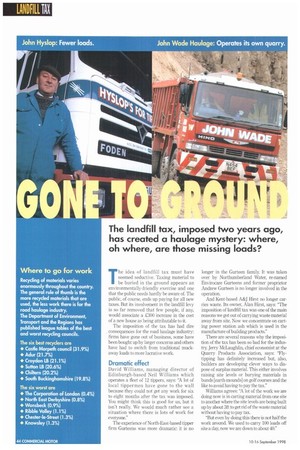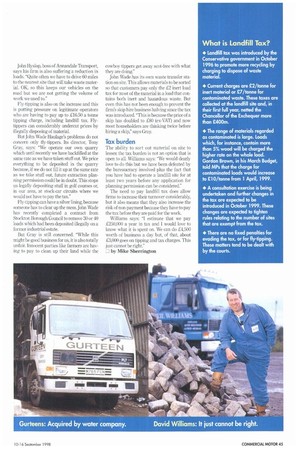The landfill tax, imposed two years ago, has created a haulage mystery: where, oh where, are those missing loads?
Page 48

Page 49

If you've noticed an error in this article please click here to report it so we can fix it.
The idea of landfill tax must have seemed seductive. Taxing material to be buried in the ground appears an environmentally-friendly exercise and one that the public needs hardly be aware of. The public, of course, ends up paying for all new taxes. But its involvement in the landfill levy is so far removed that few people, if any, would associate a 1;300 increase in the cost of a new house as being attributable to it.
The imposition of the tax has had dire . consequences for the road haulage industry: firms have gone out of business, some have been bought up by larger concerns and others have had to switch from traditional muckaway loads to more lucrative work.
Dramatic effect
David Williams, managing director of Edinburgh-based Neil Williams which operates a fleet of 12 tippers, says: "A lot of local tippermen have gone to the wall because they could not get any work for six to eight months after the tax was imposed. You might think this is good for us, but it isn't really. We would much rather see a situation where there is lots of work for everyone."
The experience of North-East-based tipper firm Gurteens was more dramatic: it is no longer in the Gurteen family. It was taken over by Northumberland Water, re-named Envirocare Gurteens and former proprietor Andrew Gurteen is no longer involved in the operation.
And Kent-based A&J Hirst no longer carries waste. Its owner, Alan Hirst, says: "The imposition of landfill tax was one of the main reasons we got out of carrying waste material away from site. Now we concentrate on carting power station ash which is used in the manufacture of building products."
There are several reasons why the imposition of the tax has been so bad for the industry. Jerry McLaughlin, chief economist at the Quarry Products Association, says: "Flytipping has definitely increased but, also, builders are developing clever ways to dispose of surplus material. This either involves raising site levels or burying materials in bands [earth mounds] on golf courses and the like to avoid having to pay the tax."
Williams agrees: "A lot of the work we are doing now is in carting material from one site to another where the site levels are being built up by about 3ft to get rid of the waste material without having to pay tax.
But even by doing this there is not half the work around. We used to carry 100 loads off site a day, now we are down to about 40." John Hyslop, boss of Annandale Transport, says his firm is also suffering a reduction in loads. "Quite often we have to drive 60 miles to the nearest site that will take waste material. OK, so this keeps our vehicles on the road but we are not getting the volume of work we used to."
Fly-tipping is also on the increase and this is putting pressure on legitimate operators who are having to pay up to £16.50 a tonne tipping charge, including landfill tax. Flytippers can considerably undercut prices by illegally disposing of material.
But John Wade Haulage's problems do not concern only fly-tippers. Its director, Tony Gray, says: "We operate our own quarry which until recently we have backfilled at the same rate as we have taken stuff out. We price everything to be deposited in the quarry because, if we do not fill it up at the same rate as we take stuff out, future extraction planning permission could be in doubt. This stops us legally depositing stuff in golf courses or, in our area, at stock-car circuits where we would not have to pay the tax."
Fly-tipping can have a silver lining, because someone has to clear up the mess. John Wade has recently completed a contract from Stockton Borough Council to remove 30 or 40 loads which had been deposited illegally on a former industrial estate.
But Gray is still concerned. "While this might be good business for us, it is also totally unfair. Innocent parties like farmers are having to pay to clean up their land while the
cowboy tippers get away scot-free with what they are doing" John Wade has its own waste transfer station on site. This allows materials to be sorted so that customers pay only the £2 inert load tax for most of the material in a load that contains both inert and hazardous waste. But even this has not been enough to prevent the firm's skip hire business halving since the tax was introduced. "This is bemuse the price of a skip has doubled to £80 (ex-VAT) and now most householders are thinking twice before hiring a skip," says Gray.
Tax burden
The ability to sort out material on site to lessen the tax burden is not an option that is open to all. Williams says: "We would dearly love to do this but we have been defeated by the bureaucracy involved plus the fact that you have had to operate a landfill site for at least two years before any application for planning permission can be considered."
The need to pay landfill tax does allow firms to increase their turnover considerably, but it also means that they also increase the risk of non-payment because they have to pay the tax before they are paid for the work,
Williams says: "I estimate that we pay £250,000 a year in tax and I would love to know what it is spent on. We can do £4,500 worth of business a day but, of that, about £3,000 goes on tipping and tax charges. This just cannot be right."
by Mike Sherrington
Where to go for work
Recycling of materials varies enormously throughout the country. The general rule of thumb is the more recycled materials that are used the less work there is for the road haulage industry.
The Department of Environment, Transport and the Regions has published league tables of the best and worst recycling councils.
The six best recyclers are • Castle Morpeth council (31.9%)
• Adur (21.r/o)
• Croydon LB (21.1%) • Sutton LB (20.6%) • Chiltern (20.2%) • South Buckinghamshire (19.8%) The six worst are • The Corporation of London (0.4%) • North East Derbyshire (0.8%) • Wansbeck (0.9%) • Ribble Valley (1.1%) • Chester-le-Street (1.3%) • Knowsley (1.3%)
What is Landfill Tax?
• Landfill tax was introduced by the Conservative government in October 1996 to promote more recycling by charging to dispose of waste material.
• Current charges are 22/tonne for inert material or 27/tonne for contaminated waste. These taxes are collected at the landfill site and, in their first full year, netted the Chancellor of the Exchequer more than 2400m.
• The range of materials regarded as contaminated is large. Loads which, for instance, contain more than 5% wood will be charged the higher rate on the whole load. Gordon Brown, in his March Budget, told MPs that the charge for contaminated loads would increase to 210/tonne from 1 April, 1999.
• A consultation exercise is being undertaken and further changes in the tax are expected to be introduced in October 1999. These changes are expected to tighten rules relating to the number of sites that are exempt from the tax.
• There are no fixed penalties for evading the tax, or for fly-tipping. These matters tend to be dealt with by the courts.
















































































































